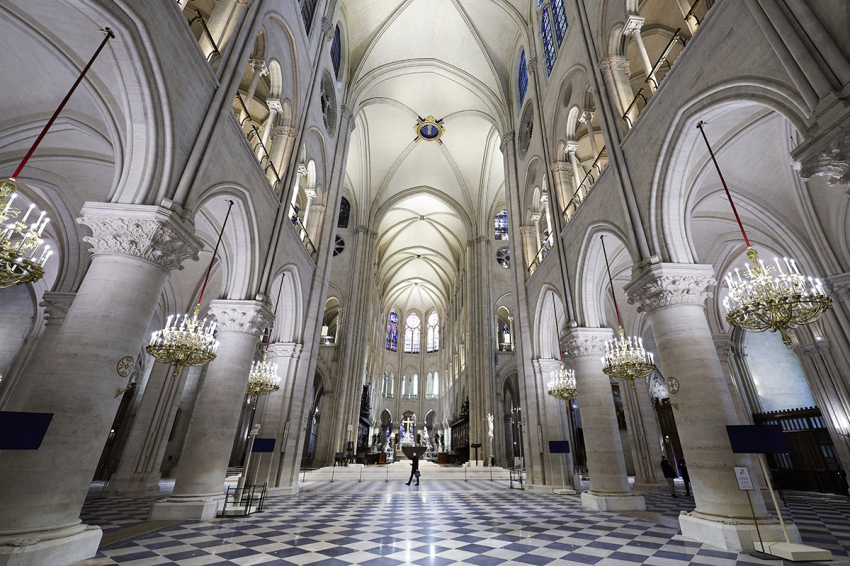French Pres. Emmanuel Macron celebrates Notre Dame restoration: 'You have transformed ashes into art'

Notre Dame cathedral, one of the most cherished symbols of French heritage and Christian devotion, is set to reopen its doors after a five-year restoration following the devastating fire that engulfed it on April 15, 2019.
French President Emmanuel Macron, who famously pledged to rebuild the cathedral within five years, toured the completed structure in November, expressing gratitude for the extraordinary efforts that have brought it back to life.
"You have transformed ashes into art," he told those present, highlighting the immense skill and dedication involved in the reconstruction.
The fire, which destroyed the famous spire, much of the cathedral's wooden roof, and parts of its stone structure, left Parisians and onlookers around the world in mourning. The inferno also covered the cathedral's nave, which risked collapse, prompting an urgent and extensive restoration effort.
Now, after years of painstaking work, the restored cathedral will once again welcome the faithful and visitors on Dec. 7-8, reclaiming its place as both a spiritual beacon and a cultural treasure.
The restoration has been a triumph of craftsmanship, faith and unity. More than €846 million ($888 million) was donated by 340,000 supporters from 150 countries, highlighting the global respect for this Christian place of worship. The funds enabled the meticulous reconstruction of Notre Dame and the preservation of its architectural integrity, ensuring it remains a testament to the vision and dedication of its original builders.
The process of reconstruction was rooted in authenticity and reverence for history. The new spire, a faithful replica of Eugène Viollet-le-Duc's 19th century design, was crafted using techniques reminiscent of medieval craftsmanship. Its base now supports a golden phoenix, symbolizing resurrection and renewal.
"The cathedral can be reborn from the ashes, like a phoenix," commented restoration architect Philippe Villeneuve, who envisioned a weathervane bird with "wings of fire" on top of the cathedral spire.
Over 1,200 oak trees, some as old as 230 years, were felled to recreate the roof's intricate timber framework, known as la forêt ("the forest"). These beams were carefully shaped and transported along the River Seine, echoing the woodworking practices of the cathedral's original carpenters.
Inside, the cathedral's transformation is awe-inspiring. The columns and walls, meticulously cleaned of centuries of grime, now radiate with a brilliance unseen in modern times. Notre Dame's famed stained-glass windows, including the three majestic rose windows, have been restored to their original vibrancy, allowing their intricate designs and vivid colors to once again flood the interior with hues of light.
The restoration of the cathedral's bells, including those damaged in the fire, marks another significant milestone. In early November, the eight bells of the northern belfry rang out for the first time since the disaster, their sound resonating as a symbol of hope and continuity.
For many, the return of the almost-intact statue of the Virgin Mary to its rightful place was particularly moving, as was the preservation of the Crown of Thorns, a relic that firefighters risked their lives to save during the blaze.
Monseigneur Patrick Chauvet, former rector of Notre Dame, recalled his first glimpse of the interior after the flames had been extinguished, describing it as an "apocalyptic vision." He added, "I haven't fully recovered from it; it's engraved in the depths of my being."
Macron reflected on the restoration effort, praising the 2,000 workers whose expertise made it possible, including artisans, architects, and craftspeople who utilized centuries-old methods to ensure authenticity.
"The blaze at Notre Dame was a national wound, and you have been its remedy through will, through work, through commitment," he remarked, adding that the cathedral's reopening will be a "shock of hope."
Although work on the forecourt and surrounding areas will continue until 2030, the cathedral itself is ready to resume its role as a place of Christian worship, reflection and inspiration. A consecration Mass and the dedication of a new altar will mark the reopening, symbolizing a spiritual rebirth and a triumphant return for this architectural masterpiece.
According to church authorities, Notre Dame welcomed 12 million visitors in 2017 and, following the restoration, now expects to receive an even higher figure of 14 million to 15 million during the coming year.
This article was originally published at Christian Today



























